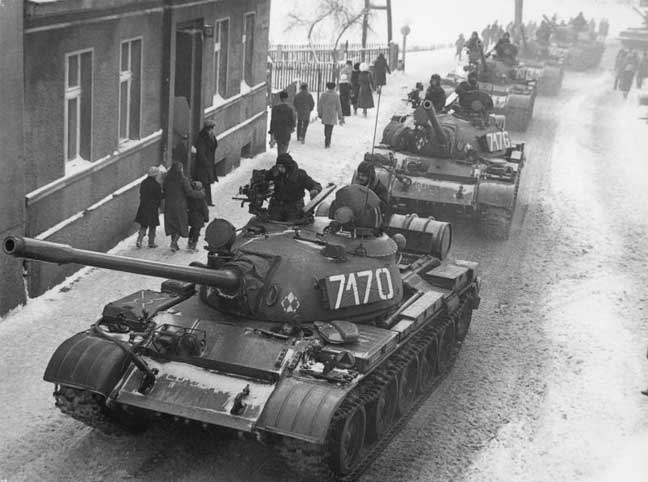1981 Martial Law in Poland

Poland Tanks
Unrest and opposition to Communist were spreading in Poland. The Solidarity movement became a nationwide movement with Lech Wales and its head, The Soviet government was very concerned about the moment and pressured the Polish government to take action. General Wojciech Jaruzelski was elected to be head of the party and his goal was to restore order. He tried to get the parliament to approve measure imposing martial law and outlawing solidarity, but it failed to. On December 12th 1981, he did it himself by imposing martial law and arresting the leaders of Solidarity including Lech Walesa. The crackdown failed to elminate the democracy movement in Poland..
In December 1981, the communist government of Poland declared martial law, suspending civil liberties, banning independent trade unions, and imposing strict censorship and media controls. The move was aimed at crushing the growing opposition movement led by the Solidarity trade union and its charismatic leader, Lech Wałęsa.
Solidarity had emerged in August 1980 as a response to economic and political repression under the communist government. The union demanded greater worker rights, an end to censorship, and an overhaul of the political system. The movement gained widespread support from workers and intellectuals, and it quickly became a powerful force for change in Poland.
However, the communist government was deeply opposed to Solidarity and saw it as a threat to its grip on power. In December 1981, General Wojciech Jaruzelski, who was both the Prime Minister and the leader of the Polish Communist Party, declared martial law, claiming that it was necessary to prevent "anarchy and civil war."
Under martial law, the government banned all independent trade unions, including Solidarity, and arrested thousands of activists, intellectuals, and dissidents. The media was placed under strict government control, and censorship was imposed on all forms of communication, including newspapers, radio, and television.
The imposition of martial law was met with widespread condemnation from the international community, with many countries imposing economic sanctions on Poland. In the United States, President Ronald Reagan denounced the move, calling it a "crude violation of human rights" and imposing sanctions on the Polish government.
Despite the government's crackdown, Solidarity continued to operate underground, organizing protests and strikes in defiance of the regime. The movement also gained support from other countries, with many international organizations and governments calling for an end to martial law and the release of political prisoners.
In 1983, the government lifted martial law, but Solidarity remained banned and many of its leaders remained in prison. The movement continued to operate underground, with support from the Catholic Church and other opposition groups.
However, the government's crackdown had a significant impact on Poland's economy and social fabric. The country's already struggling economy was further weakened by the imposition of martial law, and many people were forced to rely on black market trade to survive.
The crackdown also had a profound effect on Polish society, with many people living in fear of arrest and imprisonment. The government's use of force and censorship undermined people's trust in the political system and the media, and many turned to alternative sources of information, such as underground publications and samizdat literature.
Despite the government's attempts to suppress it, Solidarity continued to be a powerful force for change in Poland. The movement played a key role in the collapse of communism in Poland and the wider Soviet bloc, with Solidarity-backed candidates winning a landslide victory in the 1989 parliamentary elections.
 >
>